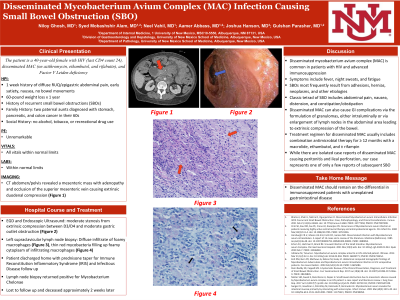Tuesday Poster Session
Category: Interventional Endoscopy
P3728 - Disseminated Mycobacterium Avium Complex Infection Causing Small Bowel Obstruction
Tuesday, October 24, 2023
10:30 AM - 4:00 PM PT
Location: Exhibit Hall

Has Audio

Niloy Ghosh, MD
University of New Mexico Health Sciences Center
Albuquerque, NM
Presenting Author(s)
Niloy Ghosh, MD, Syed Alam, MD, Neel Vahil, MD, Aamer Abbass, MD, Gulshan Parasher, MD
University of New Mexico Health Sciences Center, Albuquerque, NM
Introduction: Disseminated mycobacterium avium complex (MAC) is common in patients with HIV and advanced immunosuppression. While symptoms generally include fever, night sweats, and fatigue, there have been reports of gastrointestinal symptoms in the literature. Here we present a case of disseminated MAC causing a small bowel obstruction (SBO).
Case Description/Methods: A 40-year-old female with past medical history of HIV (last CD4 count 24), disseminated MAC (on azithromycin, ethambutol, and rifabutin), and Factor V Leiden deficiency presented with a one-week history of diffuse RUQ/epigastric abdominal pain, early satiety, nausea, lack of bowel movements (although still passing flatus), and 60-pound weight loss over the past year. The patient reported a history of recurrent SBOs that were treated medically with a small bowel follow through. Admission labs were largely within normal limits, significant only for hyponatremia, hypoalbuminemia, and anemia. CT abdomen/pelvis revealed a mesenteric mass with adenopathy and occlusion of the superior mesenteric vein causing extrinsic duodenal compression. GI was consulted and EGD with EUS was performed, with findings significant for moderate stenosis from extrinsic compression between D3/D4 and moderate gastric outlet obstruction. Subsequent left supraclavicular lymph node biopsy revealed sheets of foamy macrophages, and right inguinal lymph node excision pathology showed granulomatous lymphadenitis, suggesting disseminated MAC granulomas as the etiology for the mesenteric mass. Unfortunately, no further post-hospital follow-up was conducted, as the patient was deceased.
Discussion: SBOs are a great cause of morbidity in the United States, most frequently resulting from adhesions, hernias, neoplasms, and other etiologies. The classic tetrad of SBO includes abdominal pain, nausea, distension, and constipation/obstipation. While disseminated MAC generally affects the lungs lymph nodes, liver, and bone marrow, it can also cause complications in the gastrointestinal tract via the formulation of granulomas, either intraluminally or via enlargement of lymph nodes in the abdominal area leading to extrinsic compression of the bowel. While there are isolated case reports of disseminated MAC causing peritonitis and ileal perforation, our case represents one of only a few reports of subsequent SBO. As such, disseminated MAC should remain on the differential in immunosuppressed patients with unexplained gastrointestinal disease.

Disclosures:
Niloy Ghosh, MD, Syed Alam, MD, Neel Vahil, MD, Aamer Abbass, MD, Gulshan Parasher, MD. P3728 - Disseminated Mycobacterium Avium Complex Infection Causing Small Bowel Obstruction, ACG 2023 Annual Scientific Meeting Abstracts. Vancouver, BC, Canada: American College of Gastroenterology.
University of New Mexico Health Sciences Center, Albuquerque, NM
Introduction: Disseminated mycobacterium avium complex (MAC) is common in patients with HIV and advanced immunosuppression. While symptoms generally include fever, night sweats, and fatigue, there have been reports of gastrointestinal symptoms in the literature. Here we present a case of disseminated MAC causing a small bowel obstruction (SBO).
Case Description/Methods: A 40-year-old female with past medical history of HIV (last CD4 count 24), disseminated MAC (on azithromycin, ethambutol, and rifabutin), and Factor V Leiden deficiency presented with a one-week history of diffuse RUQ/epigastric abdominal pain, early satiety, nausea, lack of bowel movements (although still passing flatus), and 60-pound weight loss over the past year. The patient reported a history of recurrent SBOs that were treated medically with a small bowel follow through. Admission labs were largely within normal limits, significant only for hyponatremia, hypoalbuminemia, and anemia. CT abdomen/pelvis revealed a mesenteric mass with adenopathy and occlusion of the superior mesenteric vein causing extrinsic duodenal compression. GI was consulted and EGD with EUS was performed, with findings significant for moderate stenosis from extrinsic compression between D3/D4 and moderate gastric outlet obstruction. Subsequent left supraclavicular lymph node biopsy revealed sheets of foamy macrophages, and right inguinal lymph node excision pathology showed granulomatous lymphadenitis, suggesting disseminated MAC granulomas as the etiology for the mesenteric mass. Unfortunately, no further post-hospital follow-up was conducted, as the patient was deceased.
Discussion: SBOs are a great cause of morbidity in the United States, most frequently resulting from adhesions, hernias, neoplasms, and other etiologies. The classic tetrad of SBO includes abdominal pain, nausea, distension, and constipation/obstipation. While disseminated MAC generally affects the lungs lymph nodes, liver, and bone marrow, it can also cause complications in the gastrointestinal tract via the formulation of granulomas, either intraluminally or via enlargement of lymph nodes in the abdominal area leading to extrinsic compression of the bowel. While there are isolated case reports of disseminated MAC causing peritonitis and ileal perforation, our case represents one of only a few reports of subsequent SBO. As such, disseminated MAC should remain on the differential in immunosuppressed patients with unexplained gastrointestinal disease.

Figure: D3 Stenosis secondary to Extrinsic Mesenteric Obstruction
Disclosures:
Niloy Ghosh indicated no relevant financial relationships.
Syed Alam indicated no relevant financial relationships.
Neel Vahil indicated no relevant financial relationships.
Aamer Abbass indicated no relevant financial relationships.
Gulshan Parasher indicated no relevant financial relationships.
Niloy Ghosh, MD, Syed Alam, MD, Neel Vahil, MD, Aamer Abbass, MD, Gulshan Parasher, MD. P3728 - Disseminated Mycobacterium Avium Complex Infection Causing Small Bowel Obstruction, ACG 2023 Annual Scientific Meeting Abstracts. Vancouver, BC, Canada: American College of Gastroenterology.
